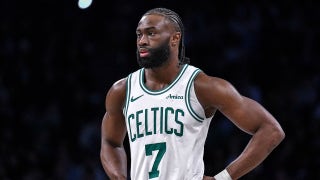LAUSANNE, Switzerland – ESPN made a pitch for U.S. Olympic television rights on Tuesday, citing the "unrivaled" assets of parent company Disney, its appeal to young viewers and plans for live coverage of all events.
ESPN president George Bodenheimer and Disney CEO Robert Iger headed a nine-person delegation that made a closed-door presentation to IOC officials on the second day of a high-stakes bidding process worth billions of dollars.
ESPN is competing against incumbent NBC and Fox.
Fox made its presentation on Monday, while NBC followed ESPN on Tuesday with the largest bid delegation of 17 people.
NBC's contingent included CEO Steve Burke, Brian Roberts, the chief executive of parent company Comcast, and Bob Costas, the longtime host of NBC's Olympic coverage.
The ESPN meeting lasted about 1 hour, 20 minutes — 40 minutes less than the allotted two-hour slot.
"We're very happy with our presentation," Bodenheimer said. "I believe the assets of the Walt Disney Co. are unequaled. We're going to make our formal bids later this afternoon and keep our fingers crossed."
The networks will submit sealed bids Tuesday afternoon. International Olympic Committee President Jacques Rogge could announce a winner by the end of the day or order a new round of bids.
The IOC wants a deal in place before its general assembly starting July 4 in Durban, South Africa.
At stake are exclusive broadcast rights to at least two Olympics — the 2014 Winter Games in Sochi, Russia, and 2016 Summer Olympics in Rio de Janeiro, Brazil. The networks can also bid on a four-games package including the 2018 and 2020 Games, whose sites have not yet been selected.
It's the first U.S. rights auction since 2003, when NBC secured the 2010 and 2012 Olympics in a deal worth $2.2 billion.
The IOC hopes to surpass that fee this time. If the IOC agrees to a four-games deal, the figure could potentially run between $4-5 billion.
Bodenheimer declined to say whether ESPN would bid for two Olympics or four. Fox sports chairman David Hill said Monday his network would try for a four-games deal.
ESPN brings the powerful Disney brand to the table, which raises the prospect of a possible tie-in with the games. GE threw in a $200 million global sponsorship as part of NBC's winning bid eight years ago.
"The platforms of the Walt Disney Co. overall are unrivaled, particularly in sport on ESPN platforms and we think that's a big advantage we have to help grow the Olympic movement," Bodenheimer said.
Both Fox and ESPN say they would carry all Olympic events live, breaking from NBC's longtime practice of airing most of the games on delay in prime time. ESPN broadcast all the matches live from last year's World Cup in South Africa.
"We think sport should be enjoyed live by sports fans so we would televise every minute of the Olympics live," Bodenheimer said, adding that ABC would also broadcast taped footage in prime time.
Bodenheimer said ESPN and Disney offer a special appeal to youth.
"We think that's an advantage that our company brings is appealing to younger sports fans," he said. "If you look at the World Cup last year, one out of every three viewers was viewing (on ESPN) on a device other than a television. Those are very young demographics and ESPN is leading the way in utilizing those type of platforms for major events and we would do that for the Olympic movement."
He also cited ESPN's partnership with ABC, which dominated the U.S. broadcast scene in the U.S. before NBC became the dominant player over the past 20 years. ABC's last Olympics was the 1988 Winter Games in Calgary.
"We have a long history with the Olympics, a long and cherished history on both sides," Bodenheimer said. "I believe that is important."
NBC has broadcast every Summer Olympics since 1988 and every Winter Games since 2002, and holds the rights through next year's London Olympics. Eight years ago, NBC and parent company General Electric outbid the same two competitors, with Fox offering $1.3 billion.
But the dynamics of this contest have shifted, with NBC now under the control of cable giant Comcast and longtime sports and Olympics chief Dick Ebersol no longer at the helm.
Ebersol resigned suddenly last month in what he said was a contract dispute with Comcast. He had been a close partner of the IOC, negotiating several multi-games deals that kept the committee's coffers bulging and ensured the stability of the games in the Olympics' most important financial market.
Comcast executives have made clear they're not interested in a repeat of the 2010 Vancouver Games, when NBC lost more than $200 million in a rough economy. NBC also stands to take a similar hit from next year's London Olympics.
If the networks opt for a four-games package, they will do so without knowing where the last two will be held. The IOC will select the 2018 host city on July 6 in Durban. The candidates are Annecy, France; Munich; and Pyeongchang, South Korea. The host of the 2020 Olympics will be chosen in 2013, and Rome is the only official contender so far.
___
Stephen Wilson can be followed at http://twitter.com/at!/stevewilsonap








































